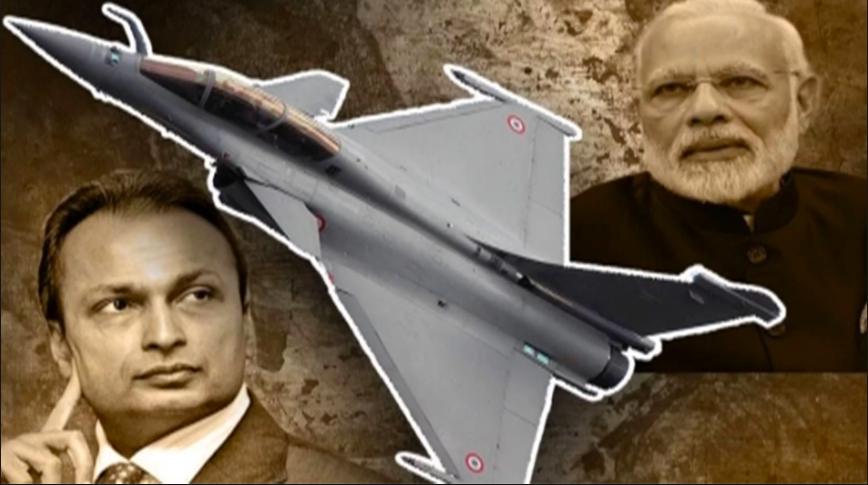Building Crony Capitalism and Calling It ‘New’ Defence Policy

Former French President François Hollande’s exposé of the role of the Indian government in the choice of Anil Ambani’s Reliance Defence Ltd as offset partner in the Rafale deal showed how crony capitalism is thriving in Modi’s India. It now transpires that the Rafale contract is not the only one in which Anil Ambani’s Reliance secured the Prime Minister’s blessings.
The Indian government has put together a whole new policy of defence procurement — the Strategic Partnership model — which keeps out all the defence public sector undertakings (PSUs) in favour of the private sector .
This strategic partnership policy is meant, initially, for four major segments — all of which are in the process of major acquisitions and floating mega contracts. These are:
-
Fighter Aircraft
-
Helicopters
-
Submarines
-
Armoured Fighting Vehicles (AFVs) / Main Battle Tanks (MBTs).
However, though not listed above, amphibian ships/landing deck platforms (LDPs) also seemed to be included for strategic partnership and reserved for the private sector.
No prizes for guessing who is the lead contender for these lucrative partnerships.
Once again, it is Anil Ambani’s Reliance Defence, while major public sector undertakings — including Hindustan Aeronautics Limited (HAL), Mazagon Dock and Hindustan Shipyard — have been frozen out of the bidding.
Also Read: EXCLUSIVE: Flying Lies?
The estimated budget amounts involved are staggering — such as Rs 80,000 crore for the four submarines, Rs 100,000 crore for 57 naval aircraft, 100,000 crore for 234 naval helicopters, Rs 20,000 crore for four amphibian platforms.
In an embarrassing development for Prime Minister Narendra Modi and his love for Anil Ambani’s debt-ridden empire, Swedish telecom manufacturing company Ericsson has now asked the Supreme Court that Anil Ambani not be allowed to do a Nirav Modi and leave the country. This is for defaulting on a Supreme Court mandated payment of Rs 550 crore that Anil Ambani’s RCom had agreed to make to Ericsson.
Turning Violations of Policy Into New Policy
Those who have followed these columns on the Rafale Deal would know that each step of the Rafale process was shrouded in secrecy and violated existing policies. What the Modi government has now done, with a pliant Defence Minister, is to convert Modi’s violations of policy into a new policy.
This policy — called “Revitalising Defence Industrial Ecosystem Through Strategic Partnerships” — was added to the Defence Procurement Policy 2016 (DPP 16), as Chapter VII on May 31, 2017.
The key elements of the policy are —
i) large scale induction of private sector in defence; ii) major contracts for defence to be used by MoD to create tie-ups between foreign suppliers and Indian players; iii) key acquisition areas will be reserved for such tie-ups; and iv) existing public sector, even those who have experience and capacities, will be kept out of such contracts.
Let us look at the big ticket items now on the anvil, and who the bidders are.
First is the purchase of another 110 fighter aircraft, urgently needed by the Indian Air Force because Modi scuttled the earlier deal for 126 aircraft.
The Dassault-Reliance joint venture is now a front-runner for the contract, with Dassault’s CEO Trappier stating that Dassault needs an order of 200 aircraft to transfer technology. He is now in the driver’s seat, having secured the order for the 36 aircraft, thanks to Modi. The Indian Air Force has invested considerably in training and integrating such aircraft in its air defence. So, 36 aircraft was only the thin end of the wedge, preparing the ground for much larger contracts under the ‘Strategic Partnership Policy’.
The second is the contract for four amphibian ships/landing deck platforms estimated to cost around Rs 20,000 crore.
By itself, Reliance Naval stands no chance of competing with either Mazagon Dock or Hindustan Shipyard. That is why the DPP 16 and the strategic partnership route allow backdoor entry of private parties without them having to compete with the public sector units.
In 2013, the Ministry of Defence (MoD) had floated a tender for two such platforms to be supplied by private parties, while two had been reserved for Hindustan Shipyard Limited. This was cancelled in early 2017, and a new tender for all four LDPs was floated, keeping Hindustan Shipyard out, and asking only L&T and Reliance Defence Systems (Anil Ambani’s Reliance) to bid.
There was no explanation why the contract to Hindustan Shipyard was cancelled, or why it was not allowed to bid. Neither has the MoD offered any explanation for keeping Mazagon Dock — the major shipbuilding enterprise in the country — out. Presumably, although not mentioned explicitly, amphibian vessels are also under the strategic partnership sector, read the private sector.
The third is to build six advanced non-nuclear submarines for the Navy, with an approximate budget of Rs 80,000 crore. Again, the only two private players are L&T and Reliance Defence Systems.
Will Mazagon Dock — which is the only shipyard in the country that has built submarines, including the nuclear submarine — be allowed to bid?
Not if we read the strategic partnership policy document, which is reserving this sector for building the private sector.
Again, Reliance Defence is a contender, even though its finances are no better than RCom’s, regarding which Ericsson is asking for Anil Ambani’s passport to be impounded.
Reliance Defence Systems is a different company from Reliance Defence Limited, the entity involved in the Rafale deal. It acquired Pipavav Shipyard in 2016, which itself was staggering under a debt of Rs 6,000 crore, and unable to pay its contractors. Pipavav Shipyard has now been renamed as Reliance Naval (RNaval), and involved in the Rs 20,000-crore LDP and Rs 80,000-crore submarine orders. By itself, RNaval stands no chance of competing with either Mazagon Dock or Hindustan Shipyard.
That is why the Defence Procurement Policy 2016 (DPP) and the strategic partnership route allow backdoor entry of private parties without them having to compete with the public sector units. Modi’s blessings are with Anil Ambani. The Force is, indeed, with him!
Also Watch: The Rafale Deal Has Put a Question Mark on the Future of the Modi Govt.
Self-Reliance Through Public Sector, Not Ambani’s Reliance
We have earlier pointed out in our columns that the key difference between Make in India and Made in India is with respect to self-reliance.
The public sector was created primarily to develop self-reliance in critical sectors, such as infrastructure and defence. These are what guarantee the ability of a country to be independent of other countries and to preserve its strategic autonomy.
It is the public sector that created India’s ability to absorb complex technologies and indigenise them.
This is the other destructive element in Modi’s policies: it is directed against both the public sector and the smaller private suppliers that provide Indian industry with its broad base.
For those who may not be aware, the Indian public sector undertakings and organisations, such as the Bhabha Atomic Research Centre (BARC) and the Indian Space Research Organisation (ISRO), have not only created indigenous technology, but also created an ecosystem around themselves. Indian electronics manufacturing came out of BARC and its spin-off, the Electronics Corporation of India Limited (ECIL). Similarly, ISRO has created a whole bunch of suppliers with capabilities to manufacture complex satellite systems and rockets.
Killing public sector undertakings, such as HAL and Mazagaon Dock, will not only kill these huge undertakings built with investments in plants and people over decades, but the entire ecosystem around them.
This is the other destructive element in Modi’s policies: it is directed against both the public sector and the smaller private suppliers that provide Indian industry with its broad base.
The PM is, instead, entirely focussed on Indian big capital — Ambani brothers, Adani, and their like. And thus the policies whereby State largesse goes not into creating technology or an industrial base, but into gifts to big capital.
Of course, such “gifts” could have “return gifts” as well. But with the new policy of elections bonds, all such return gifts from the corporate sector to political parties are now white-washed and anonymous.
Also Read: EXCLUSIVE: FLYING LIES - II
The Modi government has not only opened key strategic defence manufacturing areas to the private sector — but is reserving them exclusively for the private sector. That too, for corporates which have proven ability to take huge loans and then run down their companies to near bankruptcy. For private companies without technology or capability for such mega contracts, the government is promising to find credible foreign manufacturing partners and marry them, in a re-run of the Rafale deal.
This is what Hollande said on Rafale: it was the Indian government that forced Reliance as Dassault’s partner; the French side had no say in the matter. And now, this is India’s Strategic Partnership Policy — building crony capitalism while calling it “policy”.
Get the latest reports & analysis with people's perspective on Protests, movements & deep analytical videos, discussions of the current affairs in your Telegram app. Subscribe to NewsClick's Telegram channel & get Real-Time updates on stories, as they get published on our website.
























